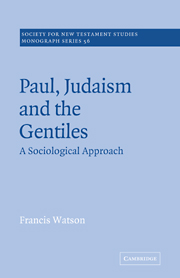Book contents
- Frontmatter
- Contents
- Preface
- Abbreviations
- 1 Paul, the Reformation and modern scholarship
- 2 The origins of Paul's view of the law
- 3 The Galatian crisis
- 4 Philippi, Corinth and the Judaizers
- 5 The situation in Rome
- 6 The social function of Romans: Rom. 2
- 7 The social function of Romans: Rom. 3–4
- 8 The social function of Romans: Rom. 5–8
- 9 The social function of Romans: Rom. 9–11
- 10 Conclusion
- Notes
- Bibliography
- Index
5 - The situation in Rome
Published online by Cambridge University Press: 11 November 2009
- Frontmatter
- Contents
- Preface
- Abbreviations
- 1 Paul, the Reformation and modern scholarship
- 2 The origins of Paul's view of the law
- 3 The Galatian crisis
- 4 Philippi, Corinth and the Judaizers
- 5 The situation in Rome
- 6 The social function of Romans: Rom. 2
- 7 The social function of Romans: Rom. 3–4
- 8 The social function of Romans: Rom. 5–8
- 9 The social function of Romans: Rom. 9–11
- 10 Conclusion
- Notes
- Bibliography
- Index
Summary
It has been the argument of the previous chapters that there is the closest possible relationship between Paul's theological reflection and the social reality of Gentile Christian congregations separated from the synagogue. He engages in theology in order to legitimate that reality. It will be the purpose of this and the following chapters to apply this principle to Paul's letter to the Romans, which is still often interpreted without any reference to the underlying social situation.
The question of the purpose of Romans
F.C. Baur was the first scholar to see Romans as a response to problems within the church at Rome. He writes: ‘It is unthinkable that the apostle, without definite circumstances present in the Roman congregation…, should have felt himself obliged to write a letter with such a content to this congregation’ (‘Zweck und Veranlassung’, 156). Baur argues that the church at Rome was composed mainly of Jewish Christians (202ff) who denied the legitimacy of Paul's Gentile mission. There was thus tension between the Jewish majority and the Gentile minority (149), and to resolve this problem Paul wrote a long defence of Christian universalism over against Jewish particularism. In this way, Baur manages to relate the purpose of Romans very closely to his interpretation of its content.
Subsequent scholarship has largely failed to maintain this unity of purpose and content; the content is related to the purpose only in the most general terms.
- Type
- Chapter
- Information
- Paul, Judaism, and the GentilesA Sociological Approach, pp. 88 - 105Publisher: Cambridge University PressPrint publication year: 1986



